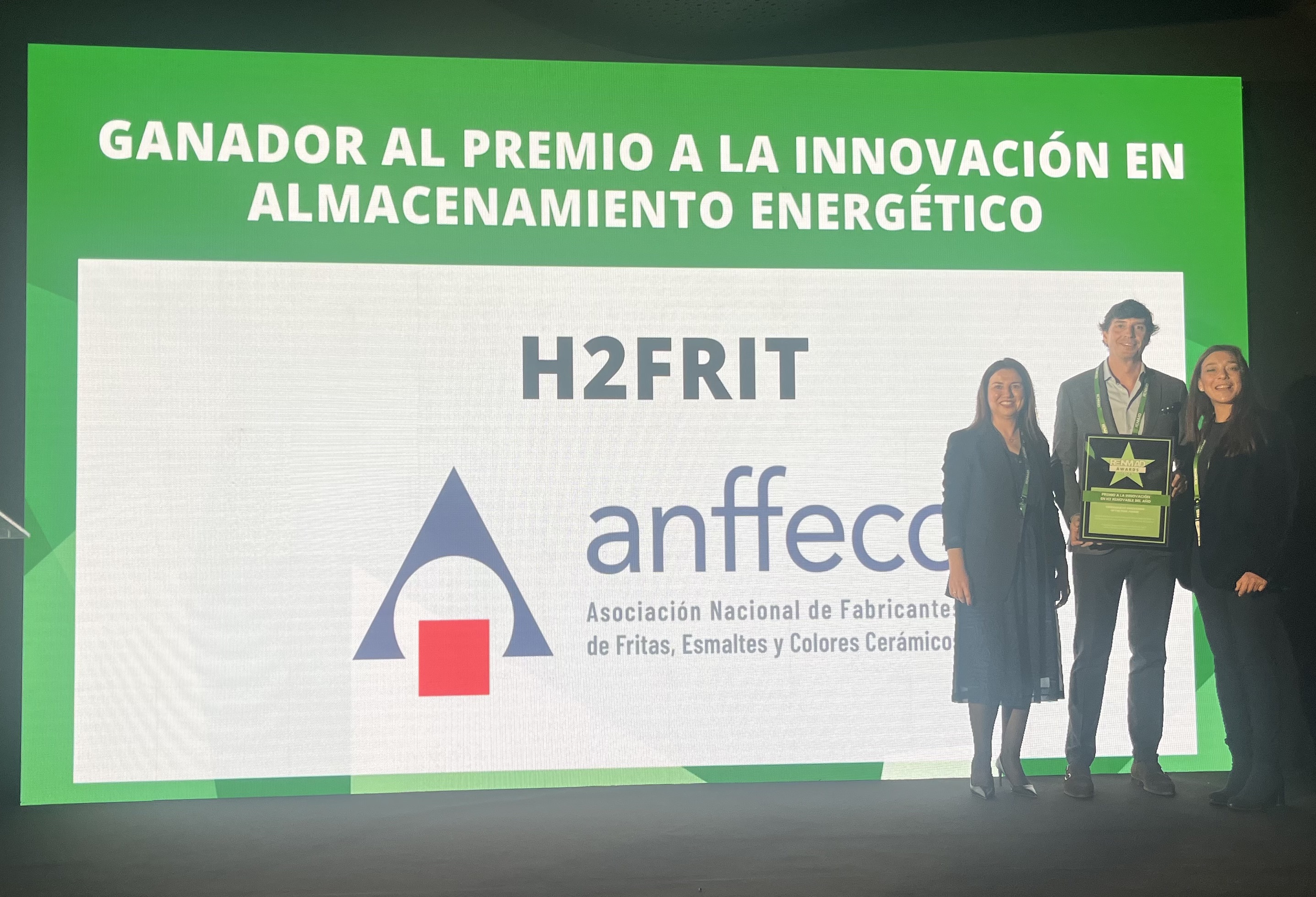ANFFECC’s H2frit project wins the RENMAD Hydrogen Innovation Award
The H2frit project, led by ANFFECC and dedicated to researching the use of hydrogen (H₂) in the production of ceramic frits as a substitute for natural gas, was yesterday awarded the RENMAD Hydrogen Innovation Prize in Zaragoza.

Castellón, 11th February 2025.- The project, of a sector-wide nature and funded by the Valencian Regional Government (Generalitat Valenciana) through its Department of Innovation, Industry, Trade and Tourism as a strategic industrial project, received the award following a popular vote, after successfully passing two semifinal rounds. Despite strong competition from other high-level national projects, H2frit has attracted great interest due to its sectoral approach and focus on decarbonisation and knowledge transfer across the entire ceramic frits industry.
The fact that the project is led by a national association and its strongly innovative character make it particularly attractive, earning it a warm reception in various national and international forums and conferences where ANFFECC has participated as a speaker. In recent months, the project was presented at the 2nd National Hydrogen Congress in Huelva, and will soon be featured in major hydrogen-related events inMadrid, Barcelona, Amsterdam, and Copenhagen, among others.
Alongside ANFFECC, the participation of Esmalglass, bp, the Institute of Ceramic Technology (ITC) and Carburos Metálicos (Air Products) as partners has beenessential to the project’s development, which this year reaches its third and final year.
The pilot tests conducted so far have yielded very positive results, confirming thatproducing ceramic frits using hydrogen is technically feasible. However, as ANFFECC has repeatedly stressed, its real-world implementation will depend on the security of hydrogen supply and its price — key factors for ensuring that companies can maintain profitability and competitiveness in international markets.
The ceramic enamel sector expresses concern over rising gas prices
Natural gas prices have risen by more than 53% in the past two months, reaching levels similar to those recorded at the beginning of 2023. The increase in costs is making it difficult for the sector to maintain its margins and poses a risk to its competitiveness.
Castellón, 11th February 2025.- The National Association of Manufacturers of Ceramic Frits, Enamels and Colours (ANFFECC) has issued a statement expressing the sector’s concern over the renewed surge in natural gas prices.
According to ANFFECC sources, “since mid-December, the price of natural gas has risen by more than 53%. It is returning to levels that are three times higher than those we had before the energy crisis, and, moreover, the short- and medium-term outlooks show no signs of decline.”
Factors such as the scarcity of renewable energy, low temperatures across Europe, and the decline in gas storage reserves have contributed to this situation, placing gas prices at levels similar to early 2023, when energy costs were still considerably high due to the war in Ukraine.
Over the past two years, “the sector’s profitability has been severely eroded — mainly due to rising energy and raw material costs, combined with declining demand as a result of global economic and geopolitical instability.”
Added to this are the growing bureaucratic and administrative costs stemming from European legislation, which pose an additional threat to competitiveness at a time when “the sector is still striving to recover its sales figures and market share, which remain affected by the previous crisis.”
All these factors are leading companies in the frits, enamels and ceramic colours sector to face “a progressive narrowing of margins which, together with the loss of competitiveness, poses a real threat to our industry.”
ANFFECC emphasises the importance of maintaining profitability in order to continue investing in R&D&I, which is “the hallmark of this industry at the international level.”
In this regard, the association warns that if energy prices continue to rise, “it will be essential to review product prices in order to achieve a sufficient level of profitability that allows us to maintain both employment and production in Spain.”